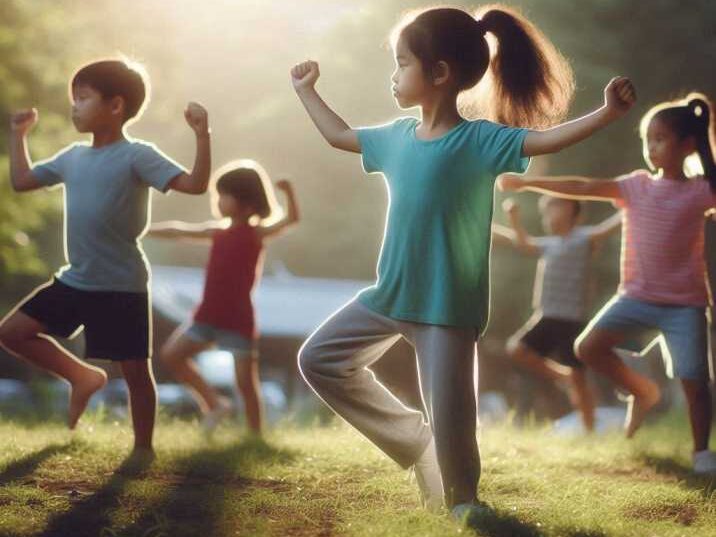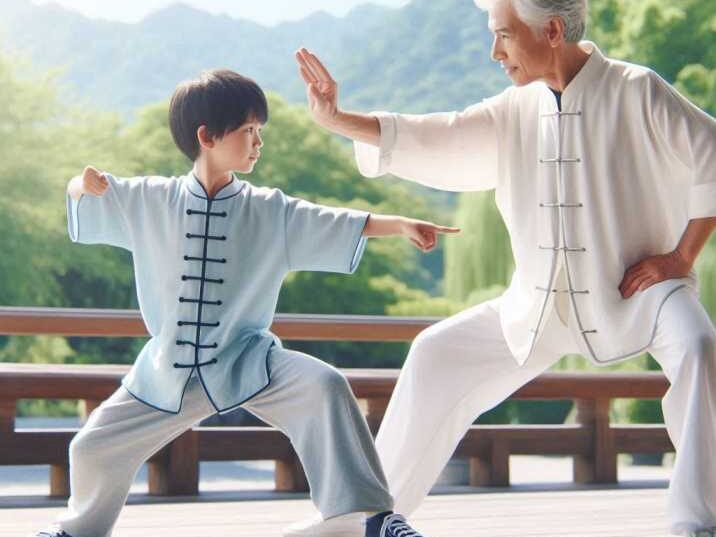Introduction
Table of Contents
Tai Chi is an ancient Chinese martial art that focuses on slow, flowing movements and deep breathing. While many people associate Tai Chi with older adults, it’s also an excellent practice for kids. Tai Chi for kids can help improve their physical health, mental focus, and even boost their confidence. In a world where kids are often glued to screens and face increasing stress, Tai Chi offers a unique way to keep them balanced and healthy. In this article, we’ll explore the many benefits of Tai Chi for kids and why it might be the perfect activity for your child.

What is Tai Chi?
The Basics of Tai Chi
Tai Chi, also known as “Tai Chi Chuan,” is a martial art that combines slow, controlled movements with deep breathing and meditation. It’s often referred to as a “moving meditation” because of its calming effects on both the mind and body. Tai Chi is rooted in traditional Chinese philosophy and emphasizes balance, harmony, and the flow of energy, known as “Qi” (pronounced “chee”).
History of Tai Chi
Tai Chi originated in ancient China over 700 years ago. Initially developed as a form of self-defense, it gradually evolved into a practice for health and relaxation. Today, millions of people around the world practice Tai Chi for its numerous physical and mental benefits.
Why Tai Chi is Great for Kids
Physical Benefits of Tai Chi for Kids
1. Improves Flexibility and Balance
Tai Chi is a unique practice that involves slow, deliberate movements that stretch and strengthen the muscles. When kids engage in Tai Chi, they gradually improve their flexibility, allowing their muscles and joints to move more freely and comfortably. This increased flexibility helps prevent muscle strains and injuries, which are common during active play or sports.
In addition to flexibility, Tai Chi also focuses on balance. The controlled, steady movements require kids to maintain their center of gravity, which enhances their ability to stay balanced. This balance training is particularly beneficial for children, as it can help prevent falls and improve their coordination in other physical activities, like soccer, basketball, or gymnastics. Over time, kids who practice Tai Chi develop a strong sense of balance, which is crucial not just for sports, but for everyday activities as well.
2. Strengthens Muscles and Joints
While Tai Chi may appear gentle, it involves sustained movements that engage and strengthen various muscle groups. Each movement in Tai Chi requires holding certain postures, which builds muscle strength in a gradual and controlled manner. This type of strength training is perfect for kids because it avoids the risks of lifting heavy weights or engaging in high-impact exercises that can strain young bodies.
In addition to muscles, Tai Chi also strengthens joints by promoting smooth, continuous movement. This is important for kids as their joints are still developing. Strong joints are essential for supporting physical activities like running, jumping, and playing sports. Regular Tai Chi practice can help kids build a solid foundation of strength in their muscles and joints, which will support them in all kinds of physical activities as they grow.
3. Promotes Better Posture
Good posture is vital for children’s overall health, but it’s often overlooked in their day-to-day lives. With the increasing time spent on devices like tablets and smartphones, many kids develop poor posture habits early on. Tai Chi, however, emphasizes proper alignment and body positioning, teaching kids how to stand, sit, and move with correct posture.
During practice of Tai Chi for kids learn to keep their spine straight, shoulders relaxed, and head aligned with their body. These habits can prevent back pain, neck strain, and other posture-related issues that may arise as they grow. Moreover, maintaining good posture through Tai Chi can boost a child’s confidence, as they naturally carry themselves with more poise and grace.
Incorporating Tai Chi into a child’s routine not only improves their flexibility, balance, muscle strength, and joint health but also instills lifelong habits of good posture, all of which contribute to their overall well-being.
Mental Benefits of Tai Chi for Kids
1. Enhances Concentration and Focus
In today’s fast-paced world, it can be challenging for kids to stay focused, especially with so many distractions around them. Tai Chi offers a solution through its slow, deliberate movements that require full attention. Each movement in Tai Chi must be performed with precision, encouraging kids to concentrate on their body’s position, balance, and breathing.
By practicing regularly Tai Chi for kids learn to focus on the present moment. This mindfulness not only helps them during Tai Chi for kids sessions but also translates to other areas of their lives, such as schoolwork and extracurricular activities. Improved concentration allows them to stay attentive in class, complete their homework with more ease, and perform better in sports and other hobbies. Over time, the enhanced focus gained from Tai Chi can lead to better academic performance and a more disciplined approach to various tasks.
2. Reduces Stress and Anxiety
Even though we often think of stress and anxiety as adult issues, kids can experience these feelings too. School pressures, social challenges, and busy schedules can create a lot of tension in young minds. Tai Chi incorporates deep breathing and meditation, which are powerful tools for managing stress and anxiety.
During Tai Chi for kids practice, kids are encouraged to breathe slowly and deeply, which helps to calm their nervous system. This controlled breathing, combined with the gentle movements of Tai Chi, promotes a sense of relaxation and peace. By practicing Tai Chi regularly, kids can develop healthy ways to cope with stress and anxiety, making it easier for them to unwind after a busy day or calm their nerves before a big test. It’s a natural and effective way for them to find inner peace amidst the chaos of daily life.
3. Boosts Confidence and Self-Esteem
Confidence is an important trait for kids to develop, and Tai Chi can play a key role in building it. As kids learn and master Tai Chi moves, they experience a sense of accomplishment. Each new movement they conquer boosts their self-esteem, giving them the confidence to tackle new challenges, both on and off the Tai Chi mat.
Moreover, the gradual progress they make in Tai Chi helps them realize that success comes from consistent effort. This mindset can encourage them to approach other activities, like school projects or sports, with the same determination. As they continue to improve in Tai Chi, kids often feel more capable and proud of their abilities, which can translate into greater self-assurance in various aspects of their lives.
Overall, Tai Chi not only strengthens kids physically but also nurtures their mental well-being by enhancing their concentration, reducing stress, and boosting their confidence.
Social Benefits of Tai Chi for Kids
1. Encourages Teamwork and Cooperation
Tai Chi is typically practiced in a group setting, which provides an excellent opportunity for kids to develop their teamwork and cooperation skills. As they move through the Tai Chi forms together, kids learn the importance of synchronizing their movements with others and maintaining harmony within the group. This fosters a sense of camaraderie and mutual respect, as they rely on one another to create a cohesive flow of movements.
During group practice, kids also learn to share space and resources, taking turns and encouraging their peers. Whether it’s a gentle reminder to adjust a posture or offering support during a challenging movement, the collaborative environment of Tai Chi for kids helps understand that working together is key to success. These lessons in teamwork and cooperation extend beyond Tai Chi, helping them in school projects, sports teams, and social interactions with friends and family.
2. Builds Discipline and Patience
The slow, deliberate pace of Tai Chi requires a level of discipline and patience that can be challenging for kids accustomed to fast-paced activities. Unlike sports that rely on quick reactions and immediate results, Tai Chi emphasizes consistent effort and gradual progress. Through regular practice, kids learn that improvement doesn’t happen overnight, but rather through persistent effort and attention to detail.
This practice instills discipline as they must follow the specific forms and movements with care. It also teaches them patience, as mastering Tai Chi takes time and practice. These traits are valuable not only in Tai Chi but also in everyday life. Kids who learn to be disciplined and patient through Tai Chi are better equipped to handle long-term projects, manage frustrations, and persevere through challenges.
How to Introduce Tai Chi to Kids
Finding the Right Instructor
When introducing your child to Tai Chi, finding the right instructor is crucial. Look for someone who has experience teaching Tai Chi to kids and can make the practice engaging and fun. A good instructor will know how to break down the movements into simple, easy-to-follow steps that kids can enjoy.

Making Tai Chi Fun for Kids
To keep kids interested in Tai Chi, it’s important to make the practice fun. Incorporating games, stories, and music can help keep their attention and make the experience enjoyable. You can also practice Tai Chi outdoors, where kids can connect with nature while moving.
Practicing Tai Chi at Home
You don’t need to go to a Tai Chi studio to practice with your child. You can practice Tai Chi at home using online videos or by learning a few basic movements together. This can be a great bonding experience and a way to help your child unwind after school.
How Tai Chi Compares to Other Activities
Tai Chi vs. Traditional Sports
While traditional sports like soccer or basketball focus on speed and competition, Tai Chi emphasizes balance and mindfulness. This makes Tai Chi a great complement to more intense physical activities, helping kids develop a well-rounded approach to fitness.
Tai Chi vs. Yoga
Both Tai Chi and yoga are excellent for flexibility, balance, and mental well-being. However, Tai Chi’s flowing movements may be more appealing to kids who enjoy movement, while yoga’s static poses might feel more restrictive. Both practices offer similar benefits, so it often comes down to personal preference.
Table of Information: Benefits of Tai Chi for Kids
| Benefit | Description |
|---|---|
| Improves Flexibility | Helps kids become more flexible, reducing the risk of injury. |
| Enhances Focus | Boosts concentration and focus, improving performance in school. |
| Reduces Stress | Teaches breathing and meditation techniques to manage stress. |
| Builds Confidence | Encourages self-esteem through mastery of movements. |
| Strengthens Muscles | Develops stronger muscles and joints for physical activities. |
| Promotes Teamwork | Fosters cooperation and teamwork during group practice. |
| Encourages Patience | Instills discipline and patience through slow, controlled movements. |
Conclusion
Tai Chi is a wonderful practice for kids, offering a wide range of physical, mental, and social benefits. Whether your child is looking to improve their focus, build confidence, or simply have fun while staying active, Tai Chi is a great choice. By introducing your child to Tai Chi, you can help them develop skills that will benefit them for life. So why not give it a try? Your child might just discover a new favorite activity!
FAQs
- Is Tai Chi safe for kids?
Yes, Tai Chi is a safe and gentle activity that is suitable for kids of all ages. - How often should kids practice Tai Chi?
Kids can practice Tai Chi a few times a week for about 30-60 minutes per session. - Can Tai Chi help with school performance?
Yes, Tai Chi can improve focus and concentration, which may help kids perform better in school. - Do kids need special equipment for Tai Chi?
No special equipment is needed for Tai Chi. Comfortable clothing and a space to move are all that’s required. - Is Tai Chi better than other martial arts for kids?
Tai Chi is unique because it focuses on balance, mindfulness, and relaxation, making it a great complement to other martial arts.


